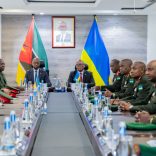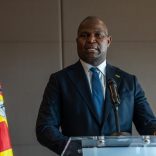Mozambique and Eswatini promise to boost cooperation
Mozambique: Portugal’s foreign affairs minister suggests UN intervention against terrorism in Cabo Delgado

File photo: Lusa
Portuguese Foreign Minister Augusto Santos Silva on Friday pointed to an intervention by the United Nations as a possibility to tackle the terrorist threat in northern Mozambique.
The possibility was put alongside two other plans, bilateral cooperation with Portugal and support from the EU.
“There is a third plan which does not depend either exclusively or mainly on us, which is the intervention at the level of the United Nations,” Santos Silva said on Portuguese radio Antena 1.
“There, the road is a bit longer because the Security Council has to pronounce itself”, without immediately “having a mission itself”, he added.
The UN has been on the ground in humanitarian aid through its agencies such as the World Food Programme (WFP), the United Nations Children’s Fund (UNICEF) or the International Organisation for Migration (IOM), among others.
According to the head of Portuguese diplomacy, another UN intervention, without detailing what type, is required due to the level of regional threat.
“The situation on the ground is very complex and we must bear in mind that we are not only talking about the north of Mozambique: one of the reasons that in my view justifies an intervention by the United Nations is that we cannot let East Africa become a field of action for international terrorism,” he said.
The threat now extends across the entire eastern strip of the continent: “if we start looking from Somalia to Mozambique, it is the whole of eastern Africa”.
Augusto Santos Silva noted that the armed conflict in Cabo Delgado also reflected “problems of unfulfilled expectations” and “the dangers of extractive economic logic: one goes to a place, one takes away resources with enormous indifference to the fate of the population and the other dimensions of development”.
The armed violence in Cabo Delgado, northern Mozambique, is causing a humanitarian crisis with more than 2,000 deaths and 560,000 displaced people, without housing or food, concentrated mainly in the provincial capital, Pemba.
The province has been under attack by insurgents for three years and some of the incursions have been claimed by the ‘jihadist’ Islamic state group since 2019.












Leave a Reply
Be the First to Comment!
You must be logged in to post a comment.
You must be logged in to post a comment.